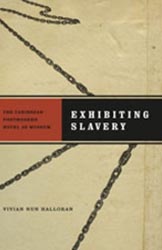Exhibiting Slavery examines the ways in which Caribbean postmodern historical novels about slavery written in Spanish, English, and French function as virtual museums, simultaneously showcasing and curating a collection of "primary documents" within their pages. As Vivian Nun Halloran attests, these novels highlight narrative "objects" extraneous to their plot—such as excerpts from the work of earlier writers, allusions to specific works of art, the uniforms of maroon armies assembled in preparation of a military offensive, and accounts of slavery's negative impact on the traditional family unit in Africa or the United States. In doing so, they demand that their readers go beyond the pages of the books to sort out fact from fiction and consider what relationship these featured "objects" have to slavery and to contemporary life. The self-referential function of these texts produces a "museum effect" that simultaneously teaches and entertains their readers, prompting them to continue their own research beyond and outside the text.
Reviews
“Exhibiting Slavery makes a comprehensive and convincingly argued linkage between recent developments in the museum culture of the transatlantic slave trade and the plethora of literary production on slavery. Halloran's is the best book to date on this important topic.
– Natasha Barnes, author of Cultural Conundrums: Race, Gender, Nation and the Making of Caribbean Cultural Politics
In her intriguing book Exhibiting Slavery, Vivian Nun Halloran argues that postmodernity —the playful, self-referential, subversively untraditional tradition, more often invoked than understood—offers Caribbean writers a unique opportunity to move among slavery’s ghosts, and to reframe cultural artifacts in ways that allow us, finally, to move beyond the surfaces of history.... If you are interested in learning about how the slave experience has shaped Caribbean literature, this is an excellent introduction to the ways that contemporary writers have grappled with this region’s dark past.
– Brendan de Caires, The Caribbean Review of Books

 The College of Arts
The College of Arts